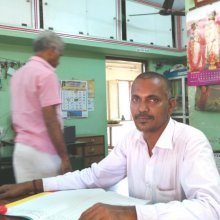Desi, Ḍesi, Deshi: 13 definitions
Introduction:
Desi means something in Hinduism, Sanskrit, Buddhism, Pali, the history of ancient India, Marathi, Jainism, Prakrit, Hindi. If you want to know the exact meaning, history, etymology or English translation of this term then check out the descriptions on this page. Add your comment or reference to a book if you want to contribute to this summary article.
Images (photo gallery)
India history and geography
Source: Cologne Digital Sanskrit Dictionaries: Indian Epigraphical GlossaryDeśī.—(EI 11), a guild of local merchants. This is also the name of Prakrit words which are neither Sanskrit (tat-sama) nor derived from Sanskrit (tad-bhava). Note: deśī is defined in the “Indian epigraphical glossary” as it can be found on ancient inscriptions commonly written in Sanskrit, Prakrit or Dravidian languages.
Source: Singhi Jain Series: Ratnaprabha-suri’s Kuvalayamala-katha (history)Deśī (देशी) was classified into eighteen dialects, as described in the Kathās (narrative poems) such as Uddyotanasūri in his 8th-century Kuvalayamālā (a Prakrit Campū, similar to Kāvya poetry).
Page 152.24 ff.: Here we have a specimen of eighteen Deśī dialects spoken in:
- Region of Godāvarī (Nasik),
- Madhyadeśa,
- Magadha,
- Antarvedī (region between Ganges and Jumna),
- Kīra (Kullu Kangra),
- Dacca,
- Sindhu,
- Maru,
- Gujarat,
- Lāṭa,
- Mālava,
- Karṇāṭaka,
- Tāpti,
- Kosala,
- Mahārāṣṭra,
- Āndhra,
- Khasa, and
- Pārasa.
These different idioms of speech were spoken by the shop-keepers in the market place of Vijayāpurī which was thus a big cosmopolitan town where merchants from all over the country displayed their goods. This reminds us of Ujjainī where the citizens knew the languages and scripts of many countries as stated by Bāṇa in the Kādambarī.

The history of India traces the identification of countries, villages, towns and other regions of India, as well as mythology, zoology, royal dynasties, rulers, tribes, local festivities and traditions and regional languages. Ancient India enjoyed religious freedom and encourages the path of Dharma, a concept common to Buddhism, Hinduism, and Jainism.
Languages of India and abroad
Pali-English dictionary
Source: BuddhaSasana: Concise Pali-English Dictionaryḍesi : (aor. of ḍeti) flied.

Pali is the language of the Tipiṭaka, which is the sacred canon of Theravāda Buddhism and contains much of the Buddha’s speech. Closeley related to Sanskrit, both languages are used interchangeably between religions.
Marathi-English dictionary
Source: DDSA: The Molesworth Marathi and English Dictionarydēśī (देशी).—a (dēśa) Relating to the Desh or country above the ghaṭs. 2 Relating to a country or place. In comp. as puṇēdēśī, vāīdēśī, taddēśī, ētaddēśī.
Source: DDSA: The Aryabhusan school dictionary, Marathi-Englishdēśī (देशी).—a Relating to a country.
--- OR ---
dēśī (देशी).—a Indigenous, made in, belonging to, relating to a country.
Marathi is an Indo-European language having over 70 million native speakers people in (predominantly) Maharashtra India. Marathi, like many other Indo-Aryan languages, evolved from early forms of Prakrit, which itself is a subset of Sanskrit, one of the most ancient languages of the world.
Sanskrit dictionary
Source: DDSA: The practical Sanskrit-English dictionaryDeśī (देशी).—
1) The dialect of a country, one of the varieties of the Prākṛta dialect; see Kāv.1.33.
2) Name of a Rāgiṇī.
Source: Cologne Digital Sanskrit Dictionaries: Monier-Williams Sanskrit-English Dictionary1) Deśī (देशी):—[from deśa] a f. See deśī.
2) [from deśa] b f. ([scilicet] bhāṣā) the vulgar dialect of a country (opp. to saṃskṛta), provincialism
3) [v.s. ...] -tva n., [Kāvyādarśa; Deśī-nāma-mālā; cf. Lexicographers, esp. such as amarasiṃha, halāyudha, hemacandra, etc.]
4) [v.s. ...] a vulgar mode of singing, [Catalogue(s)]
5) [v.s. ...] dance (opp. to mārga, pantomime), [Daśarūpa]
6) [v.s. ...] (in music) Name of a Rāgiṇī.
Source: DDSA: Paia-sadda-mahannavo; a comprehensive Prakrit Hindi dictionary (S)Deśī (देशी) in the Sanskrit language is related to the Prakrit word: Desī.
[Sanskrit to German]
Sanskrit, also spelled संस्कृतम् (saṃskṛtam), is an ancient language of India commonly seen as the grandmother of the Indo-European language family (even English!). Closely allied with Prakrit and Pali, Sanskrit is more exhaustive in both grammar and terms and has the most extensive collection of literature in the world, greatly surpassing its sister-languages Greek and Latin.
Hindi dictionary
Source: DDSA: A practical Hindi-English dictionary1) Deśī (देशी):—(a) native; indigenous, local.
2) Desī (देसी):—(a) indigenous, native, country-made.
...
Prakrit-English dictionary
Source: DDSA: Paia-sadda-mahannavo; a comprehensive Prakrit Hindi dictionary1) Desi (देसि) in the Prakrit language is related to the Sanskrit word: Dveṣin.
2) Desi (देसि) also relates to the Sanskrit word: Deśin.
2) Desi has the following synonyms: Desia.
3) Desī (देसी) also relates to the Sanskrit word: Deśī.
Prakrit is an ancient language closely associated with both Pali and Sanskrit. Jain literature is often composed in this language or sub-dialects, such as the Agamas and their commentaries which are written in Ardhamagadhi and Maharashtri Prakrit. The earliest extant texts can be dated to as early as the 4th century BCE although core portions might be older.
Kannada-English dictionary
Source: Alar: Kannada-English corpusDēśi (ದೇಶಿ):—[adjective] existing, growing or produced within a region or country; belonging (to) as a native; local; indigenous.
--- OR ---
Dēśi (ದೇಶಿ):—[noun] that which is relating to or existing, grown, produced etc. within a region or country; a local or indigenous thing.
--- OR ---
Dēśi (ದೇಶಿ):—
1) [noun] that which is particular to a region, place or country.
2) [noun] a language, though not totally different from the generality, that is spoken in a special style, manner or using special vocabulary or accent, that is particular region.
3) [noun] a musical mode in both the Karnāṭaka and Hindūstāni systems.
4) [noun] a style or manner of dancing that is particular to a region.
--- OR ---
Dēsi (ದೇಸಿ):—
1) [noun] the vernacular language of a region or country; a dialect.
2) [noun] a style in Kannaḍa language using only pure and original Kannaḍa words (without borrowing words, idioms from other languages).
3) [noun] a pure and original Kannaḍa word.
4) [noun] the custom, convention, manners, culture, etc. that is particular to a region or country.
5) [noun] beauty that is natural (as opp. to the one made up).
6) [noun] the state, quality or feeling of being superior, greater, better, etc.; superiority; excellence.
7) [noun] the act or fact or ornamenting or being ornamented.
8) [noun] a manner, mode or way in which a thing is done or to be done.
9) [noun] the quality or being proper, fitting or suitable; fitness; propriety.
10) [noun] an erstwhile organisation or federation of merchants.
11) [noun] (fig.) the quality of being ostensibly beautiful.
12) [noun] a style or manner of dancing that is particular to a region.
Kannada is a Dravidian language (as opposed to the Indo-European language family) mainly spoken in the southwestern region of India.
Nepali dictionary
Source: unoes: Nepali-English DictionaryDeśī (देशी):—adj. 1. native; indigenous; 2. home-made;
Nepali is the primary language of the Nepalese people counting almost 20 million native speakers. The country of Nepal is situated in the Himalaya mountain range to the north of India.
See also (Relevant definitions)
Starts with (+52): Deshi-mukhya, Deshiga, Deshigiti, Deshigitti, Deshikastotra, Deshikati, Deshikatodi, Deshikattari, Deshikavijaya, Deshikeshvara, Deshikopanishad, Deshikosha, Deshikottama, Deshilaka, Deshillaka, Deshin, Deshinamamala, Deshini, Deshinritya, Deshipari.
Ends with (+78): Abbhudesi, Abhinipphadesi, Abhivadesi, Acchadesi, Adeshi, Akateci, Amodesi, Anudeshi, Apadesi, Apasadesi, Aradeshi, Aradeshiparadeshi, Arateci, Arateciparateci, Ardradeshi, Asadesi, Assadesi, Atiteci, Baradeshi, Bhandesi.
Full-text (+83): Desia, Deshinamamala, Deshikattari, Deshi kajur, Deshi baval, Elba deshi, Deshi badam, Desha, Brahmi deshi, Shilaras desi, Deshitva, Deshinritya, Loban desi, Desi mattar, Desi-babul, Deshikosha, Deshishabdasamgraha, Desi badam, Papita desi, Deshitala.
Relevant text
Search found 17 books and stories containing Desi, Deshi, Ḍesi, Dēśī, Deśī, Desī, Dēsi, Dēsī, Dēśi; (plurals include: Desis, Deshis, Ḍesis, Dēśīs, Deśīs, Desīs, Dēsis, Dēsīs, Dēśis). You can also click to the full overview containing English textual excerpts. Below are direct links for the most relevant articles:
Gati in Theory and Practice (by Dr. Sujatha Mohan)
Analysis of technical terms: Mārga and Deśī < [Chapter 1 - Nāṭya]
Gati in classical forms especially Bharatanṛtya < [Chapter 4 - Practice of Gati]
Technical treatises on Nāṭya (other works) < [Chapter 1 - Nāṭya]
Rig Veda (translation and commentary) (by H. H. Wilson)
Rig Veda 6.46.12 < [Sukta 46]
Chaitanya Bhagavata (by Bhumipati Dāsa)
Verse 1.14.167 < [Chapter 14 - The Lord’s Travel to East Bengal and the Disappearance of Lakṣmīpriyā]
Verse 1.15.22 < [Chapter 15 - Marriage with Śrī Viṣṇupriyā]
Verse 1.15.19 < [Chapter 15 - Marriage with Śrī Viṣṇupriyā]
Trishashti Shalaka Purusha Caritra (by Helen M. Johnson)
Seventeen kinds of grain < [Notes]
Appendix 5.2: new and rare words < [Appendices]
Appendix 3.2: new and rare words < [Appendices]
Later Chola Temples (by S. R. Balasubrahmanyam)
Temples in Krishnapatnam < [Chapter XVI - Temples of Rajendra III’s Time]
Early Telugu Poetry-Nannaya to Tikkana < [April 1937]
Literary Achievements of Tallapaka Poets < [October – December, 1978]
Hindu Origins of Javanese Music < [January-February 1933]
Related products
(+4 more products available)






